Mississippi Today
Tornado-battered Amory in clean-up mode, but spirit and grit remain strong
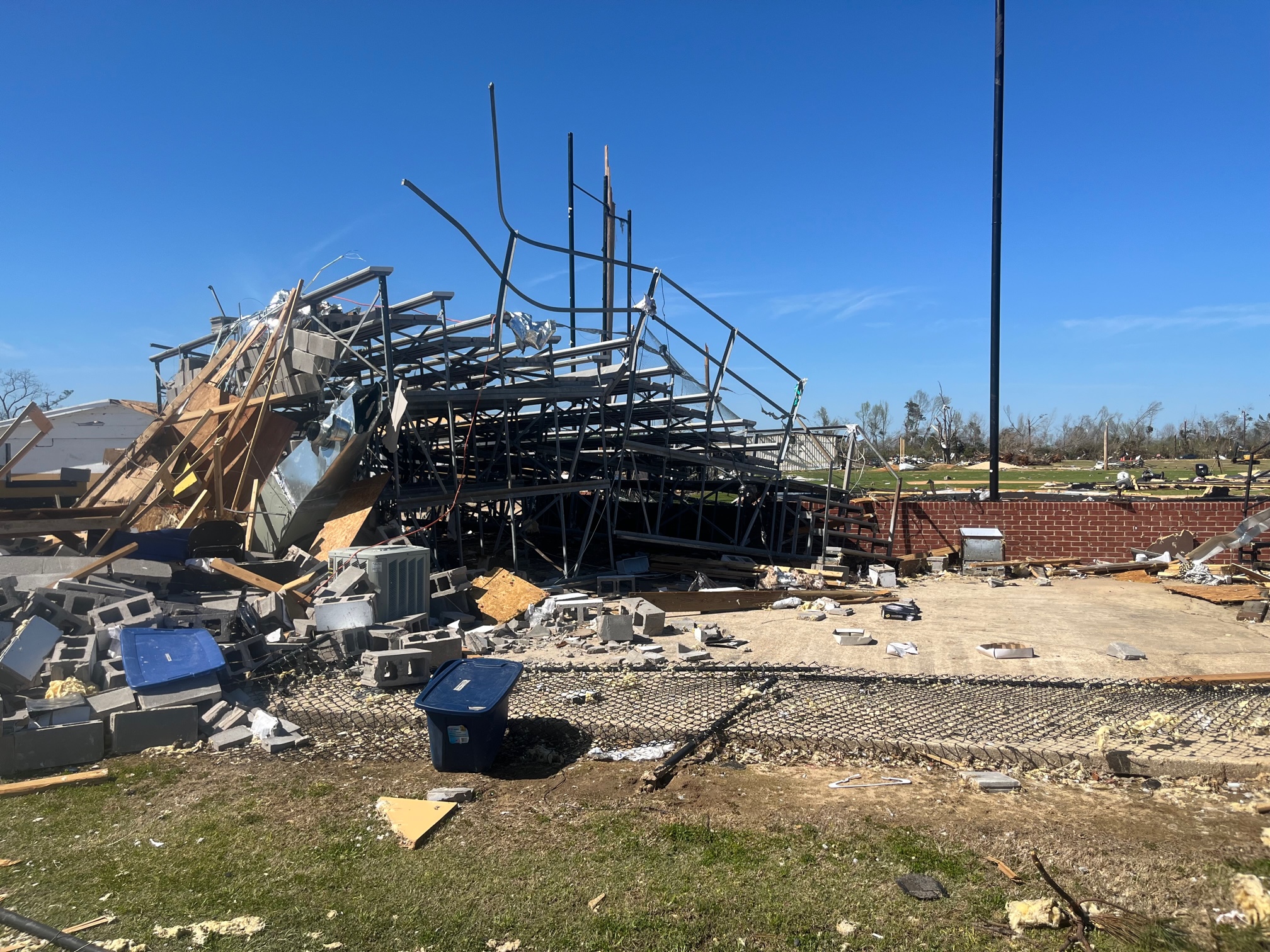
Tornado-battered Amory in clean-up mode, but spirit and grit remain strong
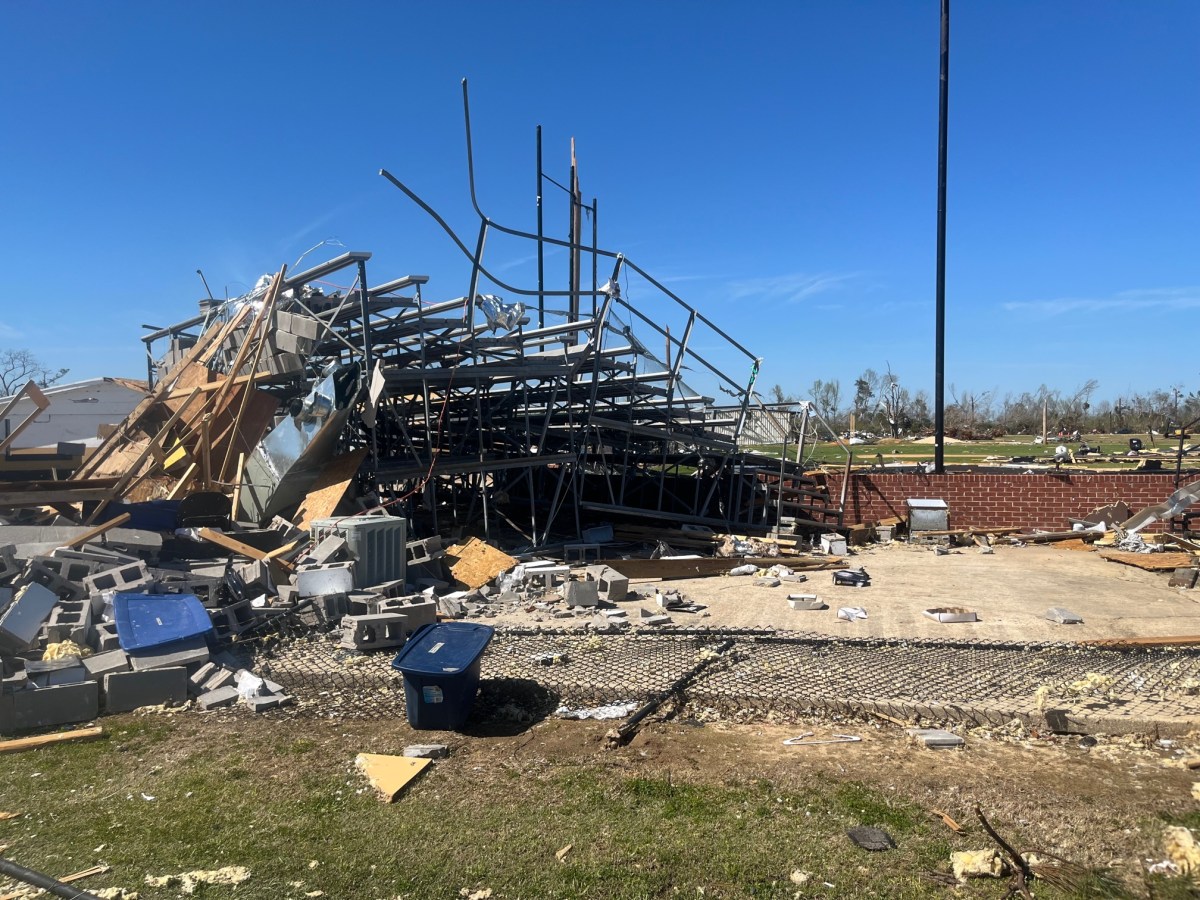
AMORY — The defending baseball state champion Amory Panthers, off to a sparkling 14-1-1 start this spring, were supposed to play a home doubleheader against rival Noxubee County here on Tuesday afternoon.
That won’t happen. There’s no place to play. The Friday night tornado that turned many Amory neighborhoods into rubble, damaged hundreds of homes and downed thousands upon thousands of trees left the ballpark unrecognizable.
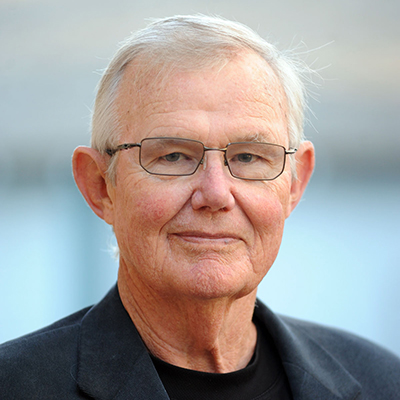
Amory High School suffered heavy damage and the baseball and softball complex was essentially blown away. The outfield fences were gone. The press boxes blew over onto the grandstands, which were dislodged. The screen behind the home plate is no more. Light poles were down all around the fields. The infield, carefully manicured before Friday night’s horrific storm, was strewn with trash and debris. Outside what used to be a concession stand were soiled baseball uniforms. The indoor batting cages were leveled, as was the team’s clubhouse. Amazingly, last year’s state championship trophy survived the storm. Across the campus, the football stadium was also heavily damaged with one set of goal posts sheared in half.
Nearby, Amory baseball coach Chris Pace spent the weekend helping with neighborhood clean-up in the heavily damaged Meadowbrook Circle area, where many of the Amory coaches and faculty live.Like it or not, Pace has become an expert at applying blue tarps to damaged roofs, including his own.
“I think Chris has helped about everyone in this neighborhood with their roofs,” down-the-street neighbor Mike Price said. “There’s been a lot of neighbors helping neighbors.”
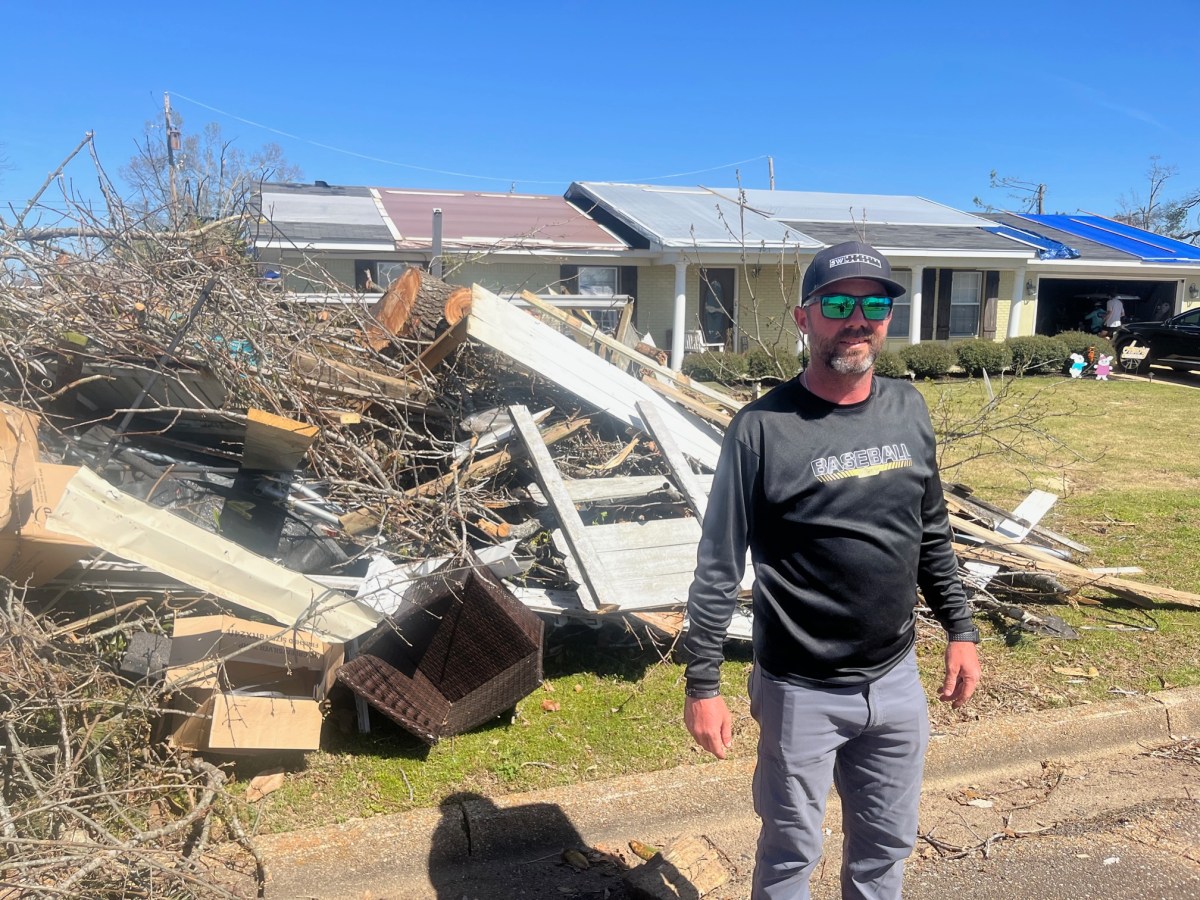
Just as Price said that, a couple came by in a small pickup truck. “Y’all need some cold bottled water?” the driver asked. “Can I interest you in a hamburger? Got some hot off the grill in here.”
A few doors down live James and Dorothy Burrow, both in their 90s, in the same house they have lived in for nearly 60 years. James was once a point guard at Mississippi State. Dorothy is one of the all-time Mississippi high school girls’ basketball greats, averaging 50 points a game one season. You’ve probably heard of their grandson: Cincinnati Bengals quarterback Joe Burrow, the former LSU Heisman Trophy winner.
The storm severely damaged the Burrows’ home when the brick chimney fell through the ripped apart roof into the den. The Burrows were safe, riding out the tornado in the storm cellar they built beneath their carport after the deadly EF-5 tornado that ravaged nearby Smithville in 2011. Jimmy Burrow (Joe’s dad) and his wife drove all night from Athens, Ohio, after they received news of Friday night’s storm.
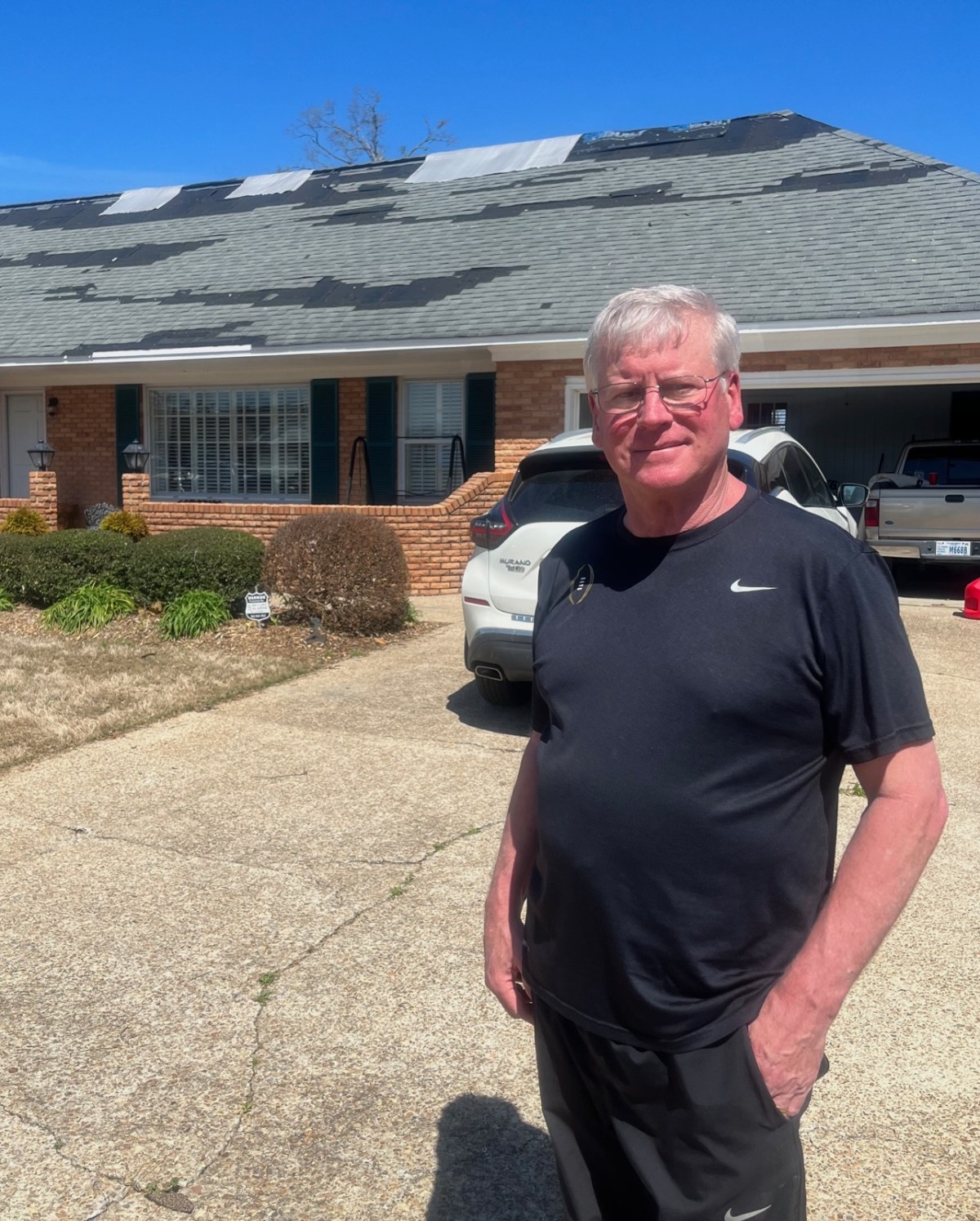
For now, the Burrows are staying at a Tupelo motel until contractors can determine whether their house can be saved. Like hundreds in this town of 6,600, the Burrows will then deal with insurance and, hopefully, rebuilding. All know it could be worse. A short drive around town is all it takes to know how amazing is is that nobody within the Amory city limits died as a result of the tornado.
Said Jimmy Burrow, standing outside the house where he grew up, “Much of this town is unrecognizable, but you can’t imagine how much has already been cleaned up. These are tough, strong people here in this town and everybody’s helping everybody.”
Pace, the Amory baseball coach since 2007, says the doubleheader with Noxubee will be rescheduled but he does not know where the games will be played. A home game with Saltillo on Saturday will be played at Saltillo instead. Pace said schools from all over north Mississippi have called offering to help and support. He’s heard from Chris Lemonis at Mississippi State and Richie Harralson at Northeast Community College offering support and a place to practice. He says nearby high schools in Hatley, Smithville and Hamilton have offered their baseball fields as a home away from home for the Amory Panthers to play and practice.
Amory lost five key players off last year’s state champs, but the Amory baseball program is one that traditionally reloads rather than rebuilds. Pace has 44 players in his high school and middle school baseball program.The goal remains a repeat state championship, but the Panthers will have do it as baseball nomads.
Don’t put it past them, says Will Hall, a former state championship quarterback at Amory who also played point guard for the basketball team. Hall, the Southern Miss football coach who played for his father Bobby Hall here, became emotional Monday morning when discussing his old hometown. “I believe in Amory. I believe in its people,” Will Hall said. “I know the fiber of those people. You just watch, Amory has been knocked down but those people build back better than ever. That’s who they are.”
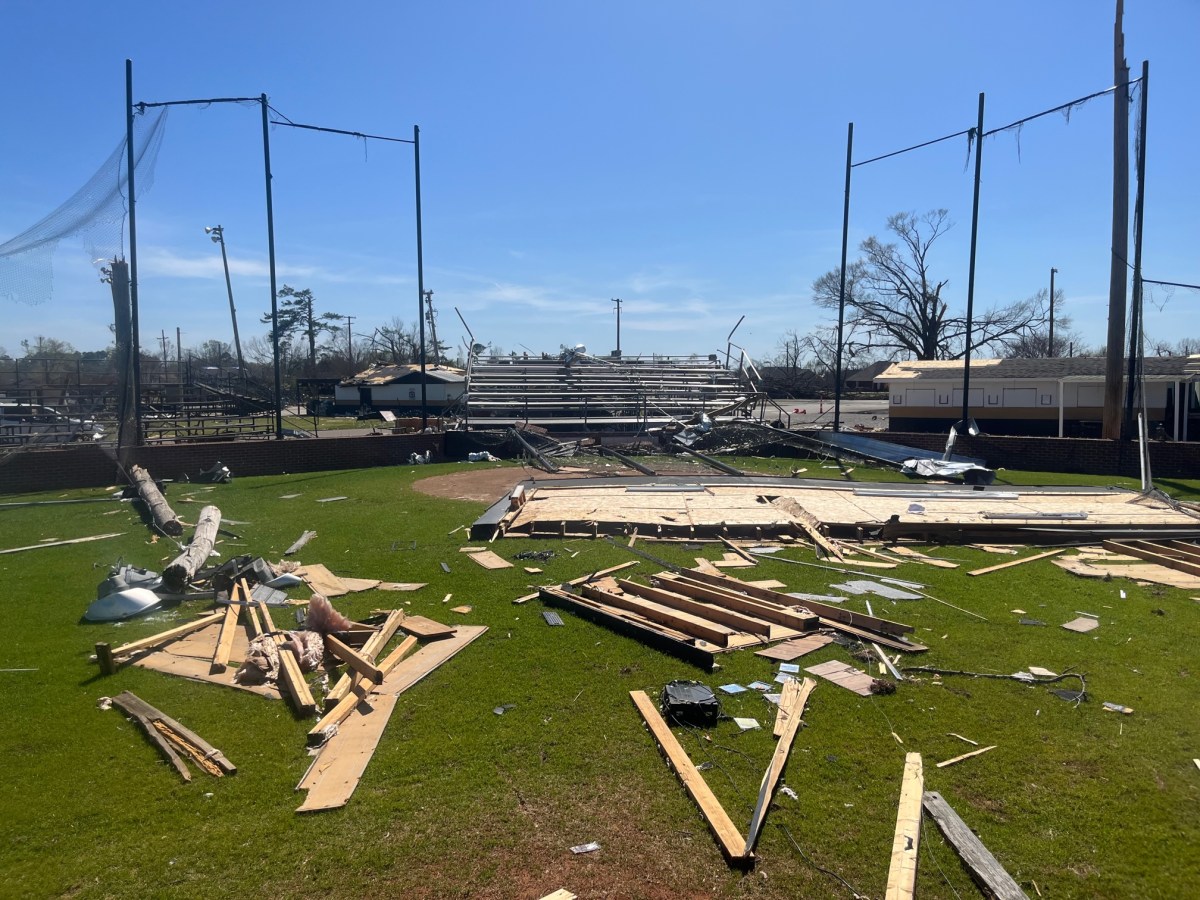
This article first appeared on Mississippi Today and is republished here under a Creative Commons license.
Did you miss our previous article…
https://www.biloxinewsevents.com/?p=228959
Mississippi Today
1964: Mississippi Freedom Democratic Party was formed
April 26, 1964

Civil rights activists started the Mississippi Freedom Democratic Party to challenge the state’s all-white regular delegation to the Democratic National Convention.
The regulars had already adopted this resolution: “We oppose, condemn and deplore the Civil Rights Act of 1964 … We believe in separation of the races in all phases of our society. It is our belief that the separation of the races is necessary for the peace and tranquility of all the people of Mississippi, and the continuing good relationship which has existed over the years.”
In reality, Black Mississippians had been victims of intimidation, harassment and violence for daring to try and vote as well as laws passed to disenfranchise them. As a result, by 1964, only 6% of Black Mississippians were permitted to vote. A year earlier, activists had run a mock election in which thousands of Black Mississippians showed they would vote if given an opportunity.
In August 1964, the Freedom Party decided to challenge the all-white delegation, saying they had been illegally elected in a segregated process and had no intention of supporting President Lyndon B. Johnson in the November election.
The prediction proved true, with white Mississippi Democrats overwhelmingly supporting Republican candidate Barry Goldwater, who opposed the Civil Rights Act. While the activists fell short of replacing the regulars, their courageous stand led to changes in both parties.
This article first appeared on Mississippi Today and is republished here under a Creative Commons Attribution-NoDerivatives 4.0 International License.![]()
Mississippi Today
Mississippi River flooding Vicksburg, expected to crest on Monday
Warren County Emergency Management Director John Elfer said Friday floodwaters from the Mississippi River, which have reached homes in and around Vicksburg, will likely persist until early May. Elfer estimated there areabout 15 to 20 roads underwater in the area.
“We’re about half a foot (on the river gauge) from a major flood,” he said. “But we don’t think it’s going to be like in 2011, so we can kind of manage this.”
The National Weather projects the river to crest at 49.5 feet on Monday, making it the highest peak at the Vicksburg gauge since 2020. Elfer said some residents in north Vicksburg — including at the Ford Subdivision as well as near Chickasaw Road and Hutson Street — are having to take boats to get home, adding that those who live on the unprotected side of the levee are generally prepared for flooding.



“There are a few (inundated homes), but we’ve mitigated a lot of them,” he said. “Some of the structures have been torn down or raised. There are a few people that still live on the wet side of the levee, but they kind of know what to expect. So we’re not too concerned with that.”
The river first reached flood stage in the city — 43 feet — on April 14. State officials closed Highway 465, which connects the Eagle Lake community just north of Vicksburg to Highway 61, last Friday.

Elfer said the areas impacted are mostly residential and he didn’t believe any businesses have been affected, emphasizing that downtown Vicksburg is still safe for visitors. He said Warren County has worked with the U.S. Army Corps of Engineers and the Mississippi Emergency Management Agency to secure pumps and barriers.
“Everybody thus far has been very cooperative,” he said. “We continue to tell people stay out of the flood areas, don’t drive around barricades and don’t drive around road close signs. Not only is it illegal, it’s dangerous.”
NWS projects the river to stay at flood stage in Vicksburg until May 6. The river reached its record crest of 57.1 feet in 2011.




This article first appeared on Mississippi Today and is republished here under a Creative Commons Attribution-NoDerivatives 4.0 International License.![]()
Mississippi Today
With domestic violence law, victims ‘will be a number with a purpose,’ mother says
Joslin Napier. Carlos Collins. Bailey Mae Reed.
They are among Mississippi domestic violence homicide victims whose family members carried their photos as the governor signed a bill that will establish a board to study such deaths and how to prevent them.
Tara Gandy, who lost her daughter Napier in Waynesboro in 2022, said it’s a moment she plans to tell her 5-year-old grandson about when he is old enough. Napier’s presence, in spirit, at the bill signing can be another way for her grandson to feel proud of his mother.
“(The board) will allow for my daughter and those who have already lost their lives to domestic violence … to no longer be just a number,” Gandy said. “They will be a number with a purpose.”
Family members at the April 15 private bill signing included Ashla Hudson, whose son Collins, died last year in Jackson. Grandparents Mary and Charles Reed and brother Colby Kernell attended the event in honor of Bailey Mae Reed, who died in Oxford in 2023.
Joining them were staff and board members from the Mississippi Coalition Against Domestic Violence, the statewide group that supports shelters and advocated for the passage of Senate Bill 2886 to form a Domestic Violence Facility Review Board.
The law will go into effect July 1, and the coalition hopes to partner with elected officials who will make recommendations for members to serve on the board. The coalition wants to see appointees who have frontline experience with domestic violence survivors, said Luis Montgomery, public policy specialist for the coalition.
A spokesperson from Gov. Tate Reeves’ office did not respond to a request for comment Friday.
Establishment of the board would make Mississippi the 45th state to review domestic violence fatalities.
Montgomery has worked on passing a review board bill since December 2023. After an unsuccessful effort in 2024, the coalition worked to build support and educate people about the need for such a board.
In the recent legislative session, there were House and Senate versions of the bill that unanimously passed their respective chambers. Authors of the bills are from both political parties.
The review board is tasked with reviewing a variety of documents to learn about the lead up and circumstances in which people died in domestic violence-related fatalities, near fatalities and suicides – records that can include police records, court documents, medical records and more.
From each review, trends will emerge and that information can be used for the board to make recommendations to lawmakers about how to prevent domestic violence deaths.
“This is coming at a really great time because we can really get proactive,” Montgomery said.
Without a board and data collection, advocates say it is difficult to know how many people have died or been injured in domestic-violence related incidents.
A Mississippi Today analysis found at least 300 people, including victims, abusers and collateral victims, died from domestic violence between 2020 and 2024. That analysis came from reviewing local news stories, the Gun Violence Archive, the National Gun Violence Memorial, law enforcement reports and court documents.
Some recent cases the board could review are the deaths of Collins, Napier and Reed.
In court records, prosecutors wrote that Napier, 24, faced increased violence after ending a relationship with Chance Fabian Jones. She took action, including purchasing a firearm and filing for a protective order against Jones.
Jones’s trial is set for May 12 in Wayne County. His indictment for capital murder came on the first anniversary of her death, according to court records.
Collins, 25, worked as a nurse and was from Yazoo City. His ex-boyfriend Marcus Johnson has been indicted for capital murder and shooting into Collins’ apartment. Family members say Collins had filed several restraining orders against Johnson.
Johnson was denied bond and remains in jail. His trial is scheduled for July 28 in Hinds County.
He was a Jackson police officer for eight months in 2013. Johnson was separated from the department pending disciplinary action leading up to immediate termination, but he resigned before he was fired, Jackson police confirmed to local media.
Reed, 21, was born and raised in Michigan and moved to Water Valley to live with her grandparents and help care for her cousin, according to her obituary.
Kylan Jacques Phillips was charged with first degree murder for beating Reed, according to court records. In February, the court ordered him to undergo a mental evaluation to determine if he is competent to stand trial, according to court documents.
At the bill signing, Gandy said it was bittersweet and an honor to meet the families of other domestic violence homicide victims.
“We were there knowing we are not alone, we can travel this road together and hopefully find ways to prevent and bring more awareness about domestic violence,” she said.
This article first appeared on Mississippi Today and is republished here under a Creative Commons Attribution-NoDerivatives 4.0 International License.
-

 News from the South - Florida News Feed6 days ago
News from the South - Florida News Feed6 days agoJim talks with Rep. Robert Andrade about his investigation into the Hope Florida Foundation
-

 News from the South - Alabama News Feed5 days ago
News from the South - Alabama News Feed5 days agoPrayer Vigil Held for Ronald Dumas Jr., Family Continues to Pray for His Return | April 21, 2025 | N
-

 Mississippi Today5 days ago
Mississippi Today5 days ago‘Trainwreck on the horizon’: The costly pains of Mississippi’s small water and sewer systems
-

 News from the South - Texas News Feed5 days ago
News from the South - Texas News Feed5 days agoMeteorologist Chita Craft is tracking a Severe Thunderstorm Warning that's in effect now
-

 News from the South - Florida News Feed4 days ago
News from the South - Florida News Feed4 days agoTrump touts manufacturing while undercutting state efforts to help factories
-

 News from the South - Virginia News Feed5 days ago
News from the South - Virginia News Feed5 days agoTaking video of military bases using drones could be outlawed | Virginia
-

 News from the South - Texas News Feed7 days ago
News from the South - Texas News Feed7 days agoNo. 3 Texas walks off No. 9 LSU again to capture crucial SEC softball series
-

 News from the South - Florida News Feed4 days ago
News from the South - Florida News Feed4 days agoFederal report due on Lumbee Tribe of North Carolina’s path to recognition as a tribal nation














































